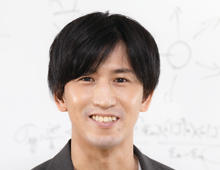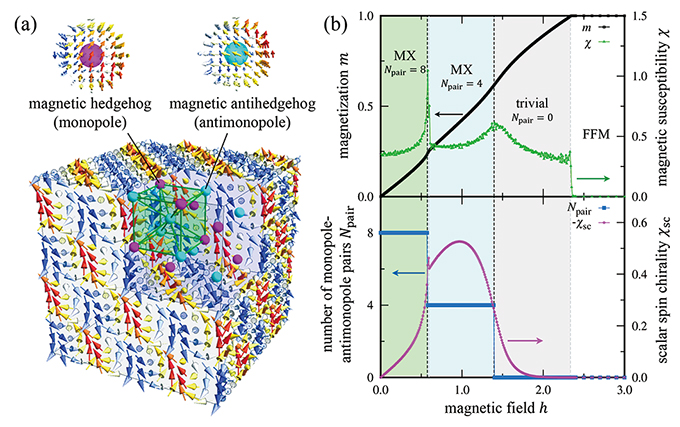Emergent Functionality Design Research Unit
Principal Investigator
- PI Name
- Shun Okumura
- Title
- Unit Leader
- Brief Resume
2020 Ph.D., Department of Applied Physics, The University of Tokyo 2020 JSPS Postdoctoral Researcher, Department of Applied Physics, The University of Tokyo 2021 Project Assistant Professor, Institute for Solid State Physics, The University of Tokyo 2023 Assistant Professor, Department of Applied Physics, The University of Tokyo 2025 Unit Leader, Emergent Functionality Design Research Unit, Cross-Divisional Materials Research Program, RIKEN Center for Emergent Matter Science (-present) 2025 Project Associate Professor, Quantum-Phase Electronics Center, The University of Tokyo (-present)

Outline
Our unit theoretically investigates emergent functionalities in quantum materials, such as electrical conductivity and magnetism. We use numerical and analytical calculations to explore the rich functional phenomena in strongly correlated electron systems where various degrees of freedom interact, such as charge, spin, orbital, and sublattice. Specifically, we calculate the electrical and optical conductivity by linear and nonlinear response theory, numerically simulate thermal equilibrium states and non-equilibrium dynamics, and design new materials based on first-principles calculations for spin-charge coupled systems, topological magnetic textures, and topological electronic states.
Research Fields
Physics, Engineering, Materials Sciences
Keywords
Theoretical materials design
Emergent electromagnetism
Topological materials
Optical properties
Spintronics
Results
Theoretical investigation of magnetic monopole crystals
Magnetic monopole is one of the elementary particles that have not yet been observed in high-energy physics experiments. However, in quantum materials, magnetic monopoles can be formed by an emergent magnetic field that reflects the geometric phase generated by electron spins. This emergent magnetic field has been actively studied in topological magnetic textures, e.g. magnetic skyrmions, as an origin of emergent electromagnetic phenomena such as the topological Hall effect.
We theoretically study magnetic monopole crystals in which magnetic monopoles and antimonopoles are periodically arranged in three-dimensional magnets. Magnetic monopoles are regarded as quasiparticles in three-dimensional topological defects called magnetic hedgehogs. We have found for the first time that magnetic monopole crystals can be stabilized in zero magnetic field and the ground state by multi-spin interactions mediated by itinerant electrons. Furthermore, we have revealed topological transitions where the number of magnetic monopole-antimonopole pairs changes sequentially in an external magnetic field.

(a) Spin texture of the monopole crystal (MX). The topological defect, magnetic (anti)hedgehog, corresponds to the magnetic (anti)monopole. (b) Magnetic field dependence of the MX. The MX turns into the forced ferromagnetic state (FFM) after the topological transitions where the number of the monopole-antimonopole pairs sequentially changes.
Publications
- S. Akatsuka, S. Esser, S. Okumura, R. Yambe, R. Yamada, M. M. Hirschmann, S. Aji, J. S. White, S. Gao, Y. Onuki, T.-h. Arima, T. Nakajima, and M. Hirschberger
Nat. Commun. 15, 4291 (2024)Non-coplanar helimagnetism in the layered van-der-Waals metal DyTe3
- Y. Hirai, S. Okumura, N. Yoshikawa, T. Oka, and R. Shimano
Phys. Rev. Research 6, L012027 (2024)Floquet Weyl states at one-photon resonance: An origin of nonperturbative optical responses in three-dimensional materials
- S. Okumura, V. P. Kravchuk, and M. Garst
Phys. Rev. Lett. 131, 066702 (2023)Instability of Magnetic Skyrmion Strings Induced by Longitudinal Spin Currents
- S. Okumura, T. Morimoto, Y. Kato, and Y. Motome
Phys. Rev. B 104, L180407 (2021)Quadratic optical responses in a chiral magnet
- S. Okumura, S. Hayami, Y. Kato, and Y. Motome
Phys. Rev. B 101, 144416 (2020)Magnetic hedgehog lattices in noncentrosymmetric metals
Contact Us
Fac. of Eng. Bldg. 6, The University of Tokyo
7-3-1 Hongo, Bunkyo-ku
313 113-8656 Japan
E-mail:
shun.okumura[at]riken.jp
